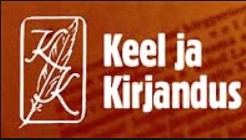Kuidas keel ruumi loob? Keelelise ruumiloome fenomenoloogia kirjanduskogemuse näitel
Linguistic spatiality: phenomenology of space-formation in speech and literature
Author(s): Tõnu ViikSubject(s): Comparative Study of Literature, Estonian Literature, Phenomenology, Theory of Literature
Published by: SA Kultuurileht
Keywords: phenomenology; linguistic experience; reading experience; fiction; spatiality;
Summary/Abstract: The paper takes a phenomenological approach and looks into spatial formations (such as a room, a territory, a landscape, a city, a country) that are indicated in conversation and texts of literary fiction. As an example of such spatial formations we can think of the “Middle-earth” in The Lord of the Rings, but also of almost any spatially situated object or action that is conveyed to us by using words. Most of the research into the readers’ experience of fiction holds the view that these spaces are imaginary, i.e. they are a product of the writer’s imagination that is conveyed to the reader’s imagination by means of reading. Based on Husserl’s theory of signs and categorial intuition in the Logical Investigations I argue, in contrast, that imagination is not required to elucidate the readers’ experience of conversational or fictional spaces. The paper maintains that human linguistic consciousness is capable of intending the spatial formations “emptily”, “unfulfilled by”, or devoid of any imaginary or perceptual details. Thus the spatial formations of literary fiction are not imagined, but linguistically intended. Linguistic experience (of reading fiction, for example) has a way of constituting its objects that is irreducible to imagination. A number of examples from the Estonian literature are analyzed to prove and illustrate this process. The spatial formations that are created in reading these texts are numerically singular and unique, but unlike the singular objects of empirical perception or imagination they are not given (in the course of the experience of reading) in a perspective, they are without any particular details regarding their visual aspects or characteristics, and their temporality differs substantially from the objects of imagination and perception; they do not change in time and are characterized by “infinite repeatability”.
Journal: Keel ja Kirjandus
- Issue Year: LXIII/2020
- Issue No: 8-9
- Page Range: 775-791
- Page Count: 17
- Language: Estonian

